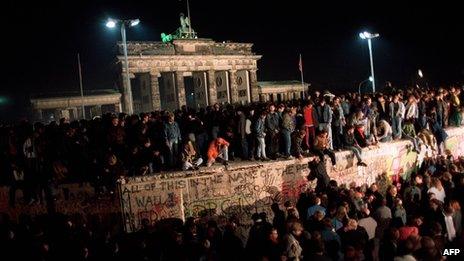Did Germany sow the seeds of the eurozone debt crisis?
- Published

Who is to blame for starting the current crisis in the eurozone? Greece? Italy? The real answer may lie further north.
It was not the behaviour of the eurozone's southern members that first plunged the single currency into crisis.
There was, from the beginning, a way for the EU to police the economies of member states by following the rules that had been laid down for the single currency in the Maastricht Treaty.
It was called the Stability and Growth Pact, and it was not Italy or Greece that torpedoed it - it was Germany.
In 2003, France and Germany had both overspent, and their budget deficits had exceeded the 3% of GDP limit to which they were legally bound.
'Told to shut-up'
The Commission - then led by the former Italian Prime Minister Romano Prodi - had the power to fine them.
But the finance ministers of what was then the 15 eurozone member countries gathered in Brussels and voted the Commission down.
They voted to let France and Germany off.
They voted not to enforce the rules they had signed-up to and which were designed to protect the stability of the single currency.
Britain's then-Chancellor, Gordon Brown - still at this stage committing sterling to its love affair with prudence - voted with the French and German position.
The EU is often criticised for the power wielded by the unelected and allegedly unaccountable European Commission.
On this vital and, as it would turn out, pivotal occasion, the Commission ran up against something much more powerful - the combined will of the democratically elected governments.
"Clearly," Romano Prodi told me, "I had not enough power.
"I tried and they [the finance ministers] told me to shut up."
Jacques Lafitte was a young French finance ministry official seconded to Brussels in the 1990s to help construct the single currency.
He said the technocrats working on the project knew that some central mechanism was needed to make sure member governments complied with the rules.
"We made a number of suggestions to the member states at the time," says Mr Lafitte.
"But these were all rejected, because they would have involved transferring sovereignty from national governments to Brussels or maybe Frankfurt."
"We knew deep inside. Again we could not say so publicly.
"We were mere technocrats. We were supposed to shut up and listen to the member states who, almost by definition, knew better. I was convinced it was not enough."
Maastricht 'gravely undermined'
Sir John Grant was Britain's ambassador to the EU at the meeting of finance ministers.
"The credibility of the Commission and the readiness of the members states to accept the authority of the Commission as the independent enforcer of the Maastricht criteria was obviously gravely undermined," he says.
It was also a signal to everyone else in Europe.
"The view was that, ok, if the big boys won't adhere and impose discipline on themselves, they're going to be more relaxed in enforcing the treaty [on us]," recalls the former Deputy Finance Minister for Greece, Peter Doukas.
"I mean, no-one can impose sanctions on Germany and France. They are the European superpowers. So they won't adhere.
"The pressure was simply not there," Mr Doukas adds.
Europe is wise after the event. The power the nations retained to police their own budgets - which, as we now know, included the power, in some cases, to cook the books - is being stripped away.
Governments in the eurozone will, in future, be required to submit their budgets in advance to Brussels for approval.
But how long before national populations revolt, in the name of democracy?
From Helsinki to Athens revolt is already stirring - and often it is shot through with anti-German sentiment.
"Germany is the locomotive of pain for other people's problems," says Peter Doukas.
"It will ask to have a much bigger say in what's happening in Greece and Italy and Spain.
"The centre of gravity of Europe is rapidly moving towards Berlin," he added.
"In the fiscal union they will be the ones dictating the terms, with France as a junior partner."
The historical resonance of a powerful Germany throwing its weight around in Europe spooks the Germans themselves. They do not seek, and do not want, leadership in Europe.
But leadership has been thrust upon them.
In November, in a powerful speech in Berlin, Polish Foreign Minister Radoslaw Sikorski appealed to Germany to act.
"I will probably be the first Polish foreign minister in history to say so, but here it is," said Mr Sikorski.
"I fear German power less than I am beginning to fear German inactivity."
It was as though he was saying "we've got over the Nazi nightmare; so should you."
The unfolding paradox is this: that a process that was motivated 20 years ago by a desire to Europeanise Germany looks likely to have precisely the opposite effect.
Much of Europe will now be required to Germanise its economic governance.
Allan Little's three-part series Europe's Choice begins on BBC Radio 4 on Sunday, 29 January at 13:30 GMT.
Parts two and three will broadcast on Sunday, 5 February and Sunday, 12 February.
You can listen again via the Radio 4 website or by downloading the Crossing Continents podcast.
- Published6 June 2012
- Published16 August 2011
- Published22 October 2011
- Published13 May 2011
- Published23 June 2011